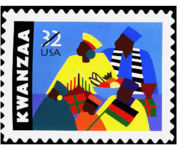Celebrating What Truly Counts
Boxing Day, Christmas, Hanukkah, Heart of the Holidays, Kwanzaa, New Year's, Stories, Thanksgiving, Winter Solstice| No Comments »Celebrating What Truly Counts
The Perfect Holiday
 As the holidays arrive it is easy to become distracted by our desire for perfection. It might be the need to craft a festive environment, always be in an upbeat mood, or simply the desire to find just the right gifts for everyone in our lives. Even though these things can be positive, if we start putting too much pressure on ourselves during this season, we are much more apt to forget what truly is important—celebrating our lives with the people we care about.
As the holidays arrive it is easy to become distracted by our desire for perfection. It might be the need to craft a festive environment, always be in an upbeat mood, or simply the desire to find just the right gifts for everyone in our lives. Even though these things can be positive, if we start putting too much pressure on ourselves during this season, we are much more apt to forget what truly is important—celebrating our lives with the people we care about.
For many of us this time of year can stir up a host of mixed emotions. For example, we might feel a tinge of nostalgia for past holiday celebrations, when times were simpler, or a sense of being let down due to the unmet expectations we have for ourselves and others. No matter what our feelings are, they are likely to be caused by an unrealistic sense of what the holidays should mean for us. Rather than thinking of this season as a time for finding the perfect gift or hosting the best party, we can get so much more out of the holidays if we create a personal inventory of the things that matter most to us. With each item we add to our list, we can then set the intention to use this season as a time to consciously rejoice in and express our appreciation for the blessings we have. The more we are able to let go of our traditional expectations for the holidays, the more open we will become to the bounteous spirit that lies within us.
Our true enjoyment of this season will only come from looking within and reflecting on the deeper spiritual significance the holidays have for us. Infusing our holiday activities with a sense of gratitude will bring a greater level of enjoyment to our life and also help us extend loving and kind energy to all we encounter. It is this spirit that will allow us to truly celebrate by sharing our greatest gifts—infinite love, peace, understanding, and joy—with those around us.
Holiday Do’s in the Workplace
Christmas, Hanukkah, Heart of the Holidays, Kwanzaa, Tips & Trivia| No Comments »Holiday Do’s in the Workplace
This time of year, the decisions that plague many a manager, leader and employee are filled with "what do I do for Christmas for my peers, boss, and direct reports?" Well, as the whole nation comes to a screeching halt and prepares for end of year numbers, final sales crunches, and multiple weeks of long over due vacation, there are a few tips to keep in mind. Make sure you handle this holiday season in a way that inspires, uplifts, shows gratitude and values who they are as people. Here are a few options…
Holiday Cards
Sometimes just a note will be enough to say Happy Holidays and Thank You for all that you Do! This works best when they are handwritten cards and when they address the specific holiday that the recipient is celebrating. Not everyone in the US celebrates Christmas. Keep in mind that if you have a multicultural work environment that your holiday options may not b merely limited to Christmas, Kwanzaa and Hanukkah. There may be other and for that reason and non-denominational or non-specific Happy Holiday greeting and card picture might be best. If your budget or time frame only allows for a card greeting this year then it will certainly express your thought and even step it up a notch with more than signature –" add a personal note. (*Do be careful what you say in way of performance in your cards, as these can later be used to prove that you thought they were doing a good job if you have to coach them at a later date. I know, I know, but it had to be said.)
Holiday Lunch or Party
A gathering of friends and family is often what makes the holidays so magical. If the team you have the privilege of working with considers each other friends, then take them to lunch all together, or have a party at someone’s house or consider having each person bring in a pot luck dish. Watch out for third shifters or late shifters who may not get to take part in the festivities. You want to uplift, not leave out those that matter. Also, watch the alcohol intake as the party of this year may turn into the grapevine of next year. Consider conducting a white elephant holiday party in which each person brings a gift valued at a small dollar amount ($10-$20) and through a series of number draws each person gets to take a gift or steal one from someone who has already gone. The funnier the gifts, the livelier the party.
Christmas Bonus
This one is a touchy one. If you have paid Christmas bonuses in the past, you want to keep doing that unless you are prepared to give ample warning. (i.e In July!) Money is not a long term motivator, but it will quickly de-motivate folks if you take it away and that may be the last thing your company needs in an effort to cut the budget. Christmas or holiday bonuses are a generous thing and employees may choose this over a trip, but one might be better off asking them what they want. Once it is spent, money is gone and often doesn’t have the same value that you think it does. Think of the last time you gave someone a raise. Did anyone hug your neck for a 3% yearly increase?
– Monica Wofford, Speaker, Author, Trainer, Business Consultant
Kwanzaa: 7 Day Pan-African Festival
Heart of the Holidays, Kwanzaa, Tips & Trivia| 1 Comment » Kwanzaa:
Kwanzaa:
7 Day Pan-African Festival
Kwanzaa (or Kwaanza) is a week-long Pan-African festival primarily honoring African-American heritage. It is observed from December 26 to January 1 each year, almost exclusively in the United States of America.
Kwanzaa consists of seven days of celebration, featuring activities such as candle-lighting and pouring of libations, and culminating in a feast and gift-giving. It was created by Ron Karenga, and first celebrated from December 26, 1966, to January 1, 1967. Karenga calls Kwanzaa the African American branch of "first fruits" celebrations of classical African cultures.
The name Kwanzaa derives from the Swahili phrase "matunda ya kwanza," meaning "first fruits." The choice of Swahili, an East African language, reflects its status as a symbol of Pan-Africanism, especially in the 1960s, though most African-Americans have West African ancestry.
 1997 began celebrating Kwanzaa as "A Celebration of Family, Community, and Culture." The first Kwanzaa stamp was issued by the United States Postal Service on October 22 at the Natural History Museum in Los Angeles, California. In 2004 a second Kwanzaa stamp, created by artist Daniel Minter was issued which has seven figures in colorful robes symbolizing the seven principles.
1997 began celebrating Kwanzaa as "A Celebration of Family, Community, and Culture." The first Kwanzaa stamp was issued by the United States Postal Service on October 22 at the Natural History Museum in Los Angeles, California. In 2004 a second Kwanzaa stamp, created by artist Daniel Minter was issued which has seven figures in colorful robes symbolizing the seven principles.
- Umoja (Unity) To strive for and to maintain unity in the family, community, nation and race.
- Kujichagulia (Self-Determination) To define ourselves, name ourselves, create for ourselves and speak for ourselves.
- Ujima (Collective Work and Responsibility) To build and maintain our community together and make our brothers’ and sisters’ problems our problems and to solve them together.
- Ujamaa (Cooperative Economics) To build and maintain our own stores, shops and other businesses and to profit from them together.
- Nia (Purpose) To make our collective vocation the building and developing of our community in order to restore our people to their traditional greatness.
- Kuumba (Creativity) To do always as much as we can, in the way we can, in order to leave our community more beautiful and beneficial than we inherited it.
- Imani (Faith) To believe with all our heart in our people, our parents, our teachers, our leaders and the righteousness and victory of our struggle.
For items to purchase that celebrate Kwanzaa, go to WomenRisingNow.com
For more detailed information, go to: Wikipedia.
